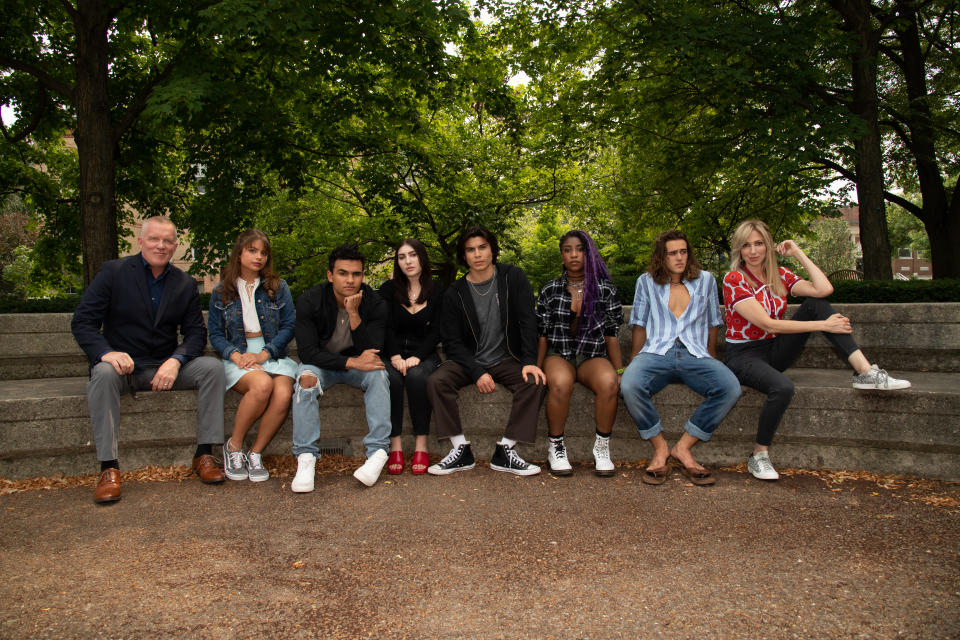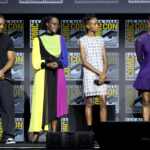Thirty-seven years ago, Anthony Michael Hall was a founding member of Shermer High School’s inaugural Breakfast Club — a motley crew of troubled teenagers spending a Saturday in detention under the semi-watchful eye of Vice Principal Richard Vernon. Flash-forward three decades and the actor is now the authority figure reluctantly overseeing a new generation of Saturday students in The Class, a loving homage to the beloved 1985 film written and directed by the late John Hughes.
“I couldn’t help but think of my good friend, Paul Gleason,” the now 54-year-old Hall tells Yahoo Entertainment, referring to the character actor who served as the Breakfast Club’s nemesis. (Gleason died in 2006.) “I think John would be proud — he would be really impressed with the work. We hope that John is up there smiling down on us, along with Paul and others.” (Watch our video interview above.)
Written and directed by Nicholas Celozzi, The Class brings together six Chicagoland students for a make-up exam that’s proctored by earnest teacher Miranda (played by Debbie Gibson — yes, that Debbie Gibson) and the school’s cynical administrator, Faulk (Hall). Much like the Breakfast Club decades earlier, this class starts the day as strangers but eventually become friends after sharing stories from their personal lives. “There’s kids that are dealing with everything from alcoholism to violence at home to their own sexuality,” Hall observes. “So we really raised the stakes thanks to Nick’s great script.”
But the kids aren’t the only ones who undergo an evolution: Both Miranda and Faulk change their attitudes as well — a notable change from the stuck-in-his-ways Vernon. Hall indicates that’s one of the ways that The Class speaks to the present day instead of dwelling on the past. “I think the film is very modern and very current in the themes and ideas that are addressed,” he says. “It’s very cool to do something that we hope a young millennial generation will respect and appreciate.”
The Breakfast Club certainly continues to be appreciated by a generation of ’80s kids. Hall was only 17 when he shot the movie alongside Emilio Estevez, Judd Nelson, Molly Ringwald and Ally Sheedy, and the memories of that period are forever lodged in his mind. “It was kind of like filming a play, because everyday we do about 10 pages and everybody had to have a close up,” he recalls. “So it was pretty intensive work in terms of filming a drama, but at the same time, there was always joy at work because John was great. He was very flexible, very collaborative and really open to suggestions.”
While there are elements of The Breakfast Club that remain trapped in the ’80s, one of the actor’s major scenes reflects an issue that couldn’t be more timely. As the teens confess to the various violations that landed them in Vernon’s Saturday detention, Hall’s nerdy alter ego, Brian, reveals in a teary monologue that he brought a flare gun to school, and it went off in his locker. The scene takes on renewed resonance against the backdrop of increased gun violence in American schools in communities like Uvalde, Tex. and Parkland, Fla.
“The gun issue in school is horrific and it’s torn our country apart in so many ways,” Hall says. “In the context of the movie, it’s a more innocent thing, but it’s interesting how we broached that given what we’ve seen in our society over the last few decades. It’s a critical issue.”
As for Brian’s monologue, Hall credits Hughes with coaching him to the emotional place where he could deliver his best work. “John would literally sit right off-camera and laugh through the take or cry through the take with you depending on the emotion of the scene. That scene was powerful, and he was that committed [to getting it right]. He was right there with us — he really was.”
In a wide-ranging interview, Hall discusses the joys of making The Class, addresses the legacy of The Breakfast Club and tells his side of a famous story involving Will Smith on the set of Six Degrees of Separation.
Watch The Class trailer:
I’m sure you’ve been approached to revisit The Breakfast Club in some form or another many times over the decades. What was it about this project that made you feel now was the time?
In our industry, there’s that old adage: “If it ain’t on the page, it ain’t on the stage.” You really do need good written material, right? In the tradition of John, the beats and the talent that Nicholas has in his script for The Class were evident right away. There’s great conflict between the characters, there’s great moments of comedy. When you read something good, you don’t want to put it down. There was never a thought that I had to remake a film that I was in or anything like that. And to be honest, I think John would be proud. We were able to take the structure of The Breakfast Club and apply a new cast and new themes for a new generation.
The Breakfast Club was largely defined by the absence of authority figures apart from Paul Gleason’s Vernon. Here, the adults are present with the kids throughout. Does that speak to the way adults seem to be more involved in kids’ lives than they were in the ’80s?
I hadn’t thought about that until right now, but you’re absolutely right. And there’s another thing, too: By the end of The Class, you realize that the kids have a powerful effect on my character and Debbie’s character and basically kind of humanize them both. They’re more with the kids than Paul was in the original. I suggested to Nicholas is that we bring the cast together a week before we started to film, and it really paid dividends because we had a group of young actors that really bonded. They were hanging out during and before rehearsal, and they’d go to the gym together, or they’d go hiking. And that fed the work because they were really rooting for each other, which was more than we could have asked for.
You mentioned that your character goes through an evolution in the film: There’s one scene early on where you and Gibson have a big argument and he sort of ridicules her for creating a “safe space” for the kids and almost coddling them. That’s a real debate that’s playing out in educational systems right now — how do you feel that scene speaks to what’s happening in the real world?
It’s definitely a different world for kids, for educators and for all so-called adults. I think that’s partly what contributes to it being a crazier world these days, right? The rate of information, the fact that everybody’s on social media and the fact that the internet is just a reality that we deal with. It’s the wild west, but it’s a reality and it affects the educational system. This generation is so smart, and they’re so evolved in many ways — they’re much more open-minded and come from the heart.
You know, as someone who hasn’t been a part of the educational system, it’s not fair for me to respond. But what I can say is that it’s representative of tolerance, and that’s really important, right? The idea of tolerance within your own community is important. When you have that kind of self-awareness, then it opens you up with fresh eyes to see the world and to respect everybody’s perspective. Part of that comes with maturation and growing older, but I think this younger generation is very much attuned to creating space for people to be themselves.
Obviously, you and Debbie Gibson were big stars in the ’80s. Did you know each other at the time?
It’s funny, I recently found some photos that triggered these memories of a birthday party that I went to for Debbie back in the ’80s! I was a young wild kid, so I didn’t remember that for years, and then these photos brought all those memories back. I think we met a couple times at that party, but I was probably partying a little bit too much. [Laughs] She’s lovely — I can’t say enough about her. She’s got a great spirit and the kids really embraced her.
When you compare how you interacted with your Breakfast Club co-stars to how the stars of The Class interacted, what are the differences you see between generations?
I joke about this, because when we were doing The Breakfast Club all those years ago, we were staying at a Hilton near O’Hare airport, so we’d go from the hotel to set. During the making of the film, Emilio and Judd and Ally were in their early 20s, and then Molly and I were [teenagers], so we would be relegated to going back to the hotel and doing homework [after shooting]. We’re all still friends and we stay in touch, but this was a different thing because the actors were all the same age. They really bonded more than we ever did.
Molly Ringwald revisited The Breakfast Club and her other John Hughes movies in a New Yorker article a few years ago, and expressed some ambivalence about them. Looking back at the movie, are there scenes where you go: “Oh, this couldn’t work now”?
I respect Molly greatly, but I haven’t read that article, so it’s not fair for me to comment. I do respect that perspective: I think some of those issues have obviously not aged. But in the spirit of the macro, I don’t think it was ever John’s intent to be offensive to people whether it’s regarding ethnicity or sexuality or whatever. It requires some forgiveness, because over time some things age well and some things don’t. There are some elements that are certainly questionable in those films without getting into the details, but I also think it’s worth appreciating the overall effect because the joy that he was trying to bring is more important.
I also feel that there’s a paradigm to John’s work, that I’ve had a long time to think about. All of the characters — despite their awkwardness and their foibles — kind of wind up a little better off than they started. That’s how John approached his work and he would do it with humor, you know? He was always coming from the heart, and he always wanted to make people laugh. That was one of his great talents, and he had an ear for that. Admittedly, some of those things are offensive to some people [now] and I respect that. That certainly was never our intention all those years ago. Good on the world if the world has evolved and people are more sensitive to each other — that’s a good thing.
I always forget that John has a cameo as Brian’s dad at the end of the movie. What’s the story behind that?
I don’t remember that being scripted, but he went for it. The other thing that was really nice was that my mother and my sister were visiting the set, and he gave them a cameo. That’s actually my mother and my little sister in the beginning of the movie. So my mother played my mother and then John shows up at the end! It was very funny.
The big question at the end of The Breakfast Club is whether those kids hang out again Monday. All these years later, do you think they ever talked to each other again?
That’s another really interesting twist on John’s part, right? He leave it to the audience to decide. I certainly would hope that they do. And the same kind of open ending is left in The Class. It’s a testament to filmmakers who have the intelligence to present material and leave it up to the audience to figure out for themselves.
The Dead Zone TV series recently celebrated its 20th anniversary — that show never gets enough credit for being part of the basic cable boom in the early 2000s. Were you a fan of the Stephen King book or the David Cronenberg film before you got that part?
I appreciate that! I’m really proud of the show and you’re absolutely right that it started at a period of time where networks started to think about programming shows year-round. It was a great experience for me. I never thought I’d have a TV show of my own, but after kind of struggling and hitting bumps in my career in my 20s, [creator] Michael Piller gave me that opportunity. It wound up running for six seasons and a lot of people keep rediscovering it, which is great.
At the time, I wasn’t aware of the novel, but I did read it and started to appreciate Stephen King’s work. He’s got a real voice as a writer. I also love Christopher Walken — he’s one of my favorite actors, up there with Jack Nicholson. It was never my intention to imitate him on any level, but we did take the look of the peacoat and the cane. After three seasons, I was looking to throw that cane off a bridge, man! I was sick of the cane. [Laughs]
You were also in the 1993 movie version of Six Degrees of Separation alongside Will Smith. There’s a longstanding story that you two were supposed to have an onscreen kissing scene, but he refused to do it at the last minute. What do you remember about what went down?
OK, so after his Oscar incident, we can settle the score on the other great incident of Will Smith’s career: Did he want to kiss me in Six Degrees of Separation? [Laughs] So what happened was that when I read for that film, I read for another role and director Fred Schepisi wanted me to play the part that I ultimately got. Basically that was just a camera trick that we did: We kind of leaned into each other, but we didn’t actually kiss. It wasn’t even an issue until I saw him doing interviews and he was talking about that. There was no objection about it [on set].
[embedded content]
I thought Will was great. I saw the charisma in him and the talent, and I’m certainly rooting for him after this [Oscar] incident. He’s a good man, and we all make mistakes. And I think that’s an interesting movie: It was a successful Broadway show, and I thought it was a really brilliant movie. Anytime you’re in a movie that gets nominated for an Oscar, you’re like, “All right, I planned that!” I didn’t plan that. I had no idea! [Laughs]
— Video produced by Kyle Moss and edited by Luis Saenz
The Class premieres Frriday, Sept. 9 in select theaters and on most digital services.




